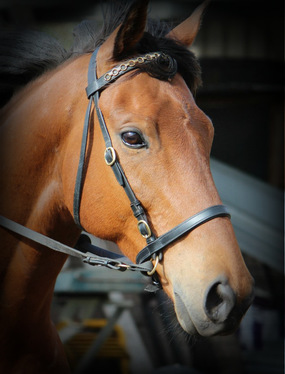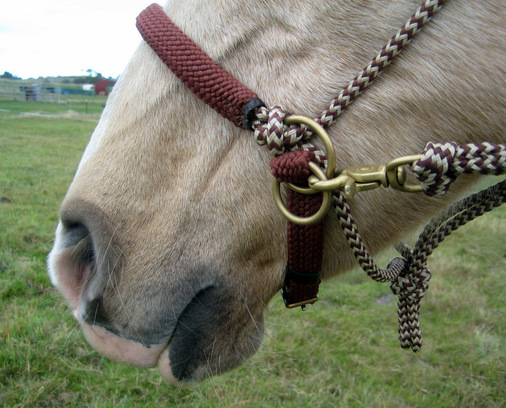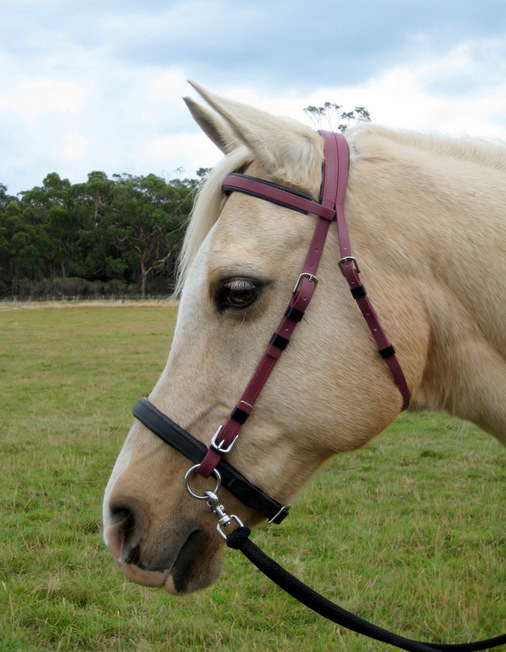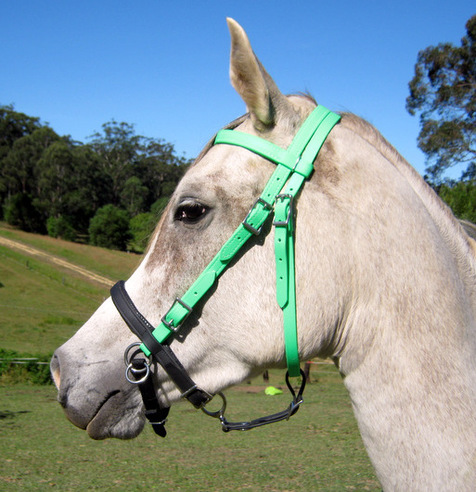LightRider Bitless Bridle Tips
Cynthia's Tips will help you get the best from your LightRider Bitless Bridle.
If you'd like more tips on bitless riding in general, we'd love to send them to you.
Simply subscribe here and we'll help you get more out of riding with a bitless bridle.
* We promise to never share your address or bombard you with emails.
If you'd like more tips on bitless riding in general, we'd love to send them to you.
Simply subscribe here and we'll help you get more out of riding with a bitless bridle.
* We promise to never share your address or bombard you with emails.
Using the LightRider Bitless Bridle with or without chinstrap
 The LightRider Bitless Noseband with the chinstrap in action.
The LightRider Bitless Noseband with the chinstrap in action.
LightRider bridles are a sidepull style of bitless, either with chinstrap action or no chinstrap action.
So, what’s the difference and how do you use it either way?
With the chinstrap in action, the reins are clipped only onto the chinstrap rings, so it moves through the noseband rings. This allows the noseband to be adjusted looser for more comfort. When the reins are used, the chinstrap takes up contact to stop the noseband and cheek pieces from moving, and to give a more refined signal, so you can use less rein pressure.
The advantage of the unique design (locking effect) and material of the chinstrap stops it from going beyond snug, so there is no over-tightening or leverage at all. Continual tightening will occur with sliding chinstraps made from rope or leather (or any other stiff material), because they don’t bend enough around the noseband ring to ‘lock’ and stop the tightening.
No Chinstrap action is useful for young horses being started, and horses who are not familiar with the feel of a chinstrap or are sensitive to close contact. By clipping the reins to both the chinstrap and noseband rings so they are held together, there is not as much contact under the jaw, but enough to get them used to it gradually.
If you have the newer version of the traditional styles of LightRider bridle (the English, Western,Stockhorse or Bitless Noseband - which have slots in the noseband rather than being sewn on), or a biothane older version, you can remove the chinstrap and just clip the reins to the noseband rings. However, you may need to have the noseband a little firmer (still be able to fit 2 fingers under it) so it doesn’t slide around and cause the cheek pieces to come too close to the eyes. The trade-off for doing this, is the noseband may not allow the jaw to open as widely for chewing or yawning, and some horses may find that firmness uncomfortable.
Removing the chinstrap is not recommended for the rope style bitless bridles (Natural and Performer) as their nosebands can’t be adjusted, and the chinstrap is still needed for noseband stability, and for keeping the cheek pieces away from the eye when using one rein.
The versatility of the LightRider bitless bridle is loved by many horses and people – it’s gentle, easily understood, effective, and a great place to start your bitless journey.
See all the LightRider Bridle styles here: www.naturalhorseworldstore.com/categories/Bitless-Bridles/ where you can also read customer’s reviews under the product description.
So, what’s the difference and how do you use it either way?
With the chinstrap in action, the reins are clipped only onto the chinstrap rings, so it moves through the noseband rings. This allows the noseband to be adjusted looser for more comfort. When the reins are used, the chinstrap takes up contact to stop the noseband and cheek pieces from moving, and to give a more refined signal, so you can use less rein pressure.
The advantage of the unique design (locking effect) and material of the chinstrap stops it from going beyond snug, so there is no over-tightening or leverage at all. Continual tightening will occur with sliding chinstraps made from rope or leather (or any other stiff material), because they don’t bend enough around the noseband ring to ‘lock’ and stop the tightening.
No Chinstrap action is useful for young horses being started, and horses who are not familiar with the feel of a chinstrap or are sensitive to close contact. By clipping the reins to both the chinstrap and noseband rings so they are held together, there is not as much contact under the jaw, but enough to get them used to it gradually.
If you have the newer version of the traditional styles of LightRider bridle (the English, Western,Stockhorse or Bitless Noseband - which have slots in the noseband rather than being sewn on), or a biothane older version, you can remove the chinstrap and just clip the reins to the noseband rings. However, you may need to have the noseband a little firmer (still be able to fit 2 fingers under it) so it doesn’t slide around and cause the cheek pieces to come too close to the eyes. The trade-off for doing this, is the noseband may not allow the jaw to open as widely for chewing or yawning, and some horses may find that firmness uncomfortable.
Removing the chinstrap is not recommended for the rope style bitless bridles (Natural and Performer) as their nosebands can’t be adjusted, and the chinstrap is still needed for noseband stability, and for keeping the cheek pieces away from the eye when using one rein.
The versatility of the LightRider bitless bridle is loved by many horses and people – it’s gentle, easily understood, effective, and a great place to start your bitless journey.
See all the LightRider Bridle styles here: www.naturalhorseworldstore.com/categories/Bitless-Bridles/ where you can also read customer’s reviews under the product description.




